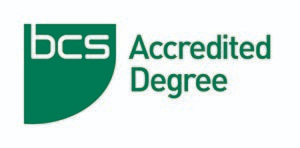
Data Science
Full-time
Part-time
One year
28 month
September 2026
In a nutshell
Make discoveries in data and bring value to businesses and organisations. With our MSc Data Science postgraduate degree, you can enhance your existing computing knowledge, or gain new skills that can help you secure a role in one of the fastest-growing employment fields in the digital economy. This programme is practical and industry focused and provides experience in Data Science and Artificial Intelligence (AI), including machine learning, deep learning and Big Data.
Developed as one of the UK's first data science postgraduate conversion courses, this Chartered Institute for IT (BCS) accredited degree will equip graduates and professionals from a wide range of disciplines, with analytical knowledge and applied programming skills.
Available with full and part-time study routes, our course will provide you with specialist data science knowledge to apply in a wide range of sectors, including healthcare, commerce, professional services, and the built environment. Start dates are available each January and September.
Don't just take it from us - Read stories from our very own MSc Data Science students and find out why they chose Salford, and what they love about being a student here:
International applicant? Please check international intakes for the latest information and application dates.
Start your MSc Data Science study journey
Register for our next Open Day where you can learn more about the course, tour our impressive new computing suites and meet the tutors
You will:
- Develop an awareness of the latest developments in databases, data mining, machine learning, deep learning, Artificial Intelligence and Big Data
- Work with real-world messy data and gain experience across the data science stack
- Broaden your mathematical aptitude as you explore 'Big Data', machine learning, deep learning, advanced statistics and data visualisation
students accepted
Course accreditations

This is for you if...
You want to enhance your existing skills and qualifications for a future career in data science
You have an enquiring mind, with a practical and analytical approach to problem solving
You're a knowledge-seeker and want to learn how to tell a story with data
All about the course
Course delivery
The course is delivered through a range of highly-focused modules. The 180-credit MSc award comprises four taught modules, plus a research dissertation. The 120-credit PgDip award comprises four taught modules.
Flexibility is at the heart of our learning approach. You can choose to study this postgraduate course full-time or part-time on campus, with start dates in January and September:
- As a full-time student, you will complete taught modules in each of the first two trimesters, and complete your 60-credit dissertation project in trimester three
- As a part-time student, you will complete taught modules in years one and two, and complete your dissertation project in year three
As part of your study preparations, you will be required to attend an intensive one-week session before formal teaching begins. This session will review basic statistics and database concepts, and provide an overview of either Python or R programming for data analysis.
Throughout the course, you will develop industry-relevant AI skills aligned with current demand in the UK technology sector.
The course timetable is designed to allow students with other commitments to structure their week around teaching sessions.
Learning experience
We've designed the Master of Data Science Course to upskill and empower graduates and professionals with limited prior subject knowledge so they are ready to take up exciting, data-driven career opportunities, giving you the technical and conceptual skills required to work with modern AI systems alongside applied data science methods. Through our industry-focus, we invite speakers from major companies and employers to participate in course delivery, providing you with real-world case studies and projects.
Current course topics include dig data analytics, advanced databases, applied statistics, data visualisations, data mining and core Artificial Intelligence techniques such as neural networks, deep learning and natural language processing. We regularly review module content with our industry partners to ensure your acquired knowledge and skill set reflects trends and needs within professional and business communities. Learn more about the current course modules in the section below.
Course team
The Data Science postgraduate course is delivered by an academic team with extensive industry experience and research connections, and a track record of developing solutions through industry partnerships. The team includes researchers in applied Artificial Intelligence, machine learning, natural language processing and AI ethics, ensuring teaching reflects state-of-the-art developments in the field.
Course leader: Professor Mo Saraee
Advanced Databases
This module will provide you with a broad overview of relational databases and Structured Query Language (SQL). You will learn the theory and practice of effective database design and will gain fluency in using SQL to query, extract and analyse data, and to create and manage databases. You will also learn key issues within the field of databases, including performance, indexing, security, recovery, and transaction management.
Big Data Tools and Techniques
This module will introduce you to Big Data, the characteristics that define it, and the challenges and opportunities it presents. You will learn how cloud computing, distributed data processing frameworks, and NoSQL databases can be used to ingest, process, analyse and store massive, complex datasets. Alongside this, practical workshops will give you hand-on experience working with a wide range of real-world datasets, including unstructured text data, image data and data from Internet of Things sensor networks. You will learn how to use Apache Spark to process large-scale data and apply data analysis, data visualisation and machine learning techniques.
Machine Learning and Data Mining
In this module, you will work through the complete data mining process, from fundamental concepts and data preprocessing to techniques such as association rule mining, clustering, classification, feature selection, and ensemble methods. You will also explore neural networks, deep learning, and text mining with sentiment analysis. Through hands-on Python and Microsoft Azure Machine Learning workshops, you will apply these supervised and unsupervised machine learning methods to real datasets and build practical skill in extracting meaningful insights from data.
Applied Statistics and Data Visualisation
This module will equip you with a strong foundation in applied statistics which you need to become a successful Data Scientist. You will cover descriptive and inferential statistics, including regression, hypothesis testing and time series analysis and will learn how to use programming languages like R to solve statistical problems. In addition, you will also be introduced to the theory and practice of data visualisation and will learn to use platforms such as Power BI to create dashboards, reports and data stories.
MSc Project
The project module aims to provide you with an opportunity to integrate learning from the course modules, working under the direction of an academic supervisor to carry out high-level coordinated academic and practical work on researching a suitable problem and developing, evaluating and critically assessing a robust, scalable and usable solution.
We take a flexible approach to our course delivery that promotes diversity and inclusivity and provides a blended learning experience, which will vary to meet specific programme requirements. This learning time includes formal lectures and interactive activities such as seminars, tutorials, practical sessions, laboratory and studio learning. Smaller classes may be used to support collaborative activities such as project and group work and presentations. A range of different assessments and feedback is offered to meet the needs of both our diverse student body and specific subject needs.
Our postgraduate taught courses are normally made up of 30 credit modules which are equal to 300 hours of learning time, or 15 credit modules which are equal to 150 hours of learning time. A Master’s degree typically comprises 180 credits, a PGDip 120 credits, and a PGCert 60 credits.
Please note that exact modules and content offered may vary in order to keep content current and, for courses that offer optional modules, may depend on the number of students selecting particular options. When accepting your offer of a place to study on a programme with optional modules, you should be aware that optional modules may not all run each year. Your tutor will be able to advise you as to the available options on or before the start of the programme. Whilst the University tries to ensure that you can undertake your preferred options, it cannot guarantee this.
School of Science, Engineering and Environment
Rising to the challenge of a changing world, our postgraduate courses are designed to shape the next generation of urbanists, scientists, engineers, consultants and leaders.
Shaped by industry, and delivered by supportive programme teams, you can develop the skills to take your career potential further.
Learning Environment
As a data science student, you will use computing suites equipped with software platforms and languages in machine learning, data mining, and statistical analysis. These include programming languages such as Python, R and SQL, and industry standard tools and platforms such as PowerBI, Apache Spark, Databricks and MongoDB.
Industry collaboration and research
When you start this degree course with Salford, you are joining a community making a difference in industry, our local region and in our wider society.
Many of our academics and technicians who support your course also lead collaborative, interdisciplinary, high-impact work in a range of local and global computing and informatics issues and challenges.
Discover how you are part of something bigger.
After your data science masters degree
EMPLOYMENT
Demand for data scientists outstrips supply and there is continued demand for qualified professionals across many global industries.
As a data science graduate, you’ll be equipped with the skill set and technical knowledge relevant for the data science and big data job market.
> Listen to graduate Priya talk about how her placement resulted in a new role
> Read how course graduate Gemma secured a role with the NHS
> Read how the live placement feature helped graduate Tom to secure a role at Channel 4
FURTHER STUDY
You might also choose to take your subject interest further with postgraduate research. The Salford Innovation and Research Centre (SIRC) is home to Informatics PhD and Research Master’s opportunities in knowledge discovery and semantic web, software engineering, big data, data mining and analytics, cyber security, information visualisation and virtual environments.
Explore our Doctoral School to learn more about research training, support and opportunities.
Career Links
Salford leads an industrial liaison committee to gain advice on our computing programmes and course content. Companies involved in this initiative include Web Applications UK, AutoTrader, Cooperative, DAI and FastWebMedia - a mixture of companies who rely on IT and data for their operations. This diversity ensures we understand industry needs from multiple perspectives and helps us to nurture graduates with strong employability and transferable skill sets.
How to get accepted on the data science masters degree course
APPLICANT PROFILE
This course is ideal for mathematics, computing or science graduates, and experienced professionals, eager to join the data storytelling revolution.
ENGLISH LANGUAGE REQUIREMENTS
All of our courses are taught and assessed in English. If English is not your first language, you must meet our minimum English language entry requirements. An IELTS score of 6.0 (no element below 5.5) is proof of this, and we also accept a range of equivalent qualifications.
Read more about our English language requirements, including information about pathways that can help you gain entry on to our degree courses. If you do not have the English language requirements, you could take our Pre-Sessional English course.
PRE-ENROLLMENT ATTENDANCE
As part of the course preparation, you will attend an intensive one-week session prior to the start of the course. This session will review basic statistics and database concepts, plus an overview of either Python or R programming for data analysis.
INTERNATIONAL APPLICATIONS
Please check international intakes for the latest information and application dates.
PROFESSIONAL ACCREDITATION
This degree is accredited by BCS, the Chartered Institute for IT. An accredited degree provides a valuable contribution towards professional membership and evidencing breadth of knowledge. Some employers give preference to applicants who have accredited degrees, and an accredited degree is likely to be recognised by other countries that are signatories to international accords.
Undergraduate degree
The minimum requirement is a second class division honours degree or equivalent in any discipline, with previous demonstrable mathematical aptitude e.g. (A-level or BTEC Mathematics).
International student entry requirements
We accept qualifications from all around the world. Find your country to see a full list of entry requirements.
Accreditation of Prior Learning (APL)
We welcome applications from students who may not have formal/traditional entry criteria but who have relevant experience or the ability to pursue the course successfully.
The Accreditation of Prior Learning (APL) process could help you to make your work and life experience count. The APL process can be used for entry onto courses or to give you exemptions from parts of your course.
Two forms of APL may be used for entry: the Accreditation of Prior Certificated Learning (APCL) or the Accreditation of Prior Experiential Learning (APEL).
For more information or enquires about this scheme, please contact: AdmissionsSEE-PGT@salford.ac.uk
The cost of studying data science
For students beginning their studies in January 2026, please see fees for 2025/26.
| Type of study | Year | Fees |
|---|---|---|
| Full-time home | 2025/26 | £10,350 per year |
| Full-time international | 2025/26 | £19,100 per year |
| Full-time home | 2026/27 | £10,620 per year |
| Full-time international | 2026/27 | £19,980 per year |
| Part-time | 2026/27 | Calculated on a pro rata basis |
Additional costs
Having your own laptop (16GB of RAM and an Ethernet port) is not essential, but it will give you more flexibility in where and how you engage with the software you will need to use during your studies (software is provided as part of the course).
You should consider further costs which may include books, stationery, printing, binding and general subsistence on trips and visits.
International student scholarships
If you are a high-achieving international student, you may be eligible for one of our scholarships. Learn more about our latest international scholarships.


